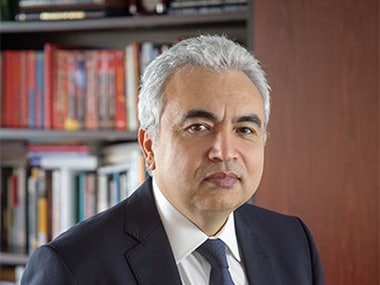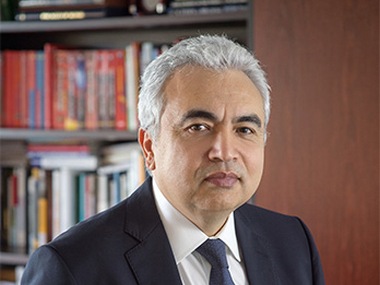Fatih Birol has served as executive director of the International Energy Agency (IEA) since September 2015. Prior to this, Birol spent 20 years as a staff member at the agency, most recently serving as chief economist. He has been named by Forbes Magazine as one of the most influential people on the world energy scene and was recognised by the Financial Times as energy personality of the year in 2017. He also chairs the World Economic Forum’s (Davos) Energy Advisory Board and serves on the UN Secretary-General’s Advisory Board on ‘Sustainable Energy for All’. He is also the founder and chair of the IEA Energy Business Council. Shreerupa Mitra spoke with Birol on his recent visit to India: Geo-politically, we are living uncertain times. How do you foresee some of the big energy trends in the medium term? [caption id=“attachment_5164461” align=“alignleft” width=“380”]  File image of International Energy Agency executive director Fatih Birol. Image courtesy: IEA.org[/caption] You’re right. The global energy landscape is changing rapidly. If I can give a couple of examples: the United States has been an energy importer for years and years but now—thanks to shale revolution—they are changing and becoming a major energy exporter, especially for oil and gas. This will change the dynamics of oil and gas markets, energy geopolitics, we may even see foreign policy implications. Second, China. Chinese energy demand will continue to grow but slower than in the past and in another direction. When we talked about China a few years ago, China and coal were always spoken of together. But China is now pushing in the direction of clean energy. And it is driven by strong government policies under the motto “making the skies of China blue again”. Solar, wind, nuclear power, electric cars, efficiency: these are top priorities for the Chinese energy policy. So, there is a big change there. And third, a new country is going to lead the new energy demand growth, which is India. India is moving to the centre stage of global energy affairs as a result of strong and stable economic growth, very strong industrialisation, modernisation of society. As a result of that, we see that India’s energy demand will be the highest in the world and as such, India will be a key player in the global energy markets for years to come. OPEC recently announced a one million barrel per day (mbpd) increase in supply. Do you think that is enough to contain market volatility given the looming Iran sanctions and the acute political crisis in Venezuela? First of all, I should tell you that as we speak, oil price is about $77. The price may be a bit of a challenge for several oil importing countries, especially those who are in the development phase of their economies. If you look at the next few months, I see reasons to worry about future developments because of at least two important facts: Global oil demand is growing very strongly—this year and next year, it is about 1.4-1.5 mbpd, which is very strong growth, stronger than previous historical averages. But at the same time, when I look at the production side, the supply side varies. Perhaps, the most important one is Venezuela. Venezuela’s oil production in two years, about 22 months, has halved from 2 mbpd to 1 mbpd. And my worry is that it will continue to fall. Second, when we look at some of the key West Asian countries, there is major uncertainty about their production and export prospects such as Libya, Iran, and Nigeria. So, these are reasons why I believe that if the OPEC-alliance countries do not increase the production further, we may well see tightening in the oil markets towards the end of this year and this may well put pressure on prices which, I believe, is not good news for oil importing countries but maybe in the medium- and long-term, not good news for oil exporting countries as well. You have been following India’s energy policies for a long time. What is your assessment of the recent policy changes in the India’s energy sector? Unfortunately, I travel a lot. In the past year, I spent 200 days at international conferences, meeting prime ministers, ministers, my colleagues in the industry and academia. I tell many colleagues that India is one of the countries where the energy sector is managed the best. When I say this, it is not only due to my sympathies with India, but because of facts. I can mention a couple of important achievements: The first one is, for me, is a historic milestone: In April, the Indian government declared that all Indian villages now have access to electricity. Only a few years ago, 500 million people did not have electricity. It is a great achievement, not only for India but all of us, and one we need to celebrate. The second, which I believe is very important, is the major programme that started with LPG. Ujjawala is a great programme: around 50 million households have access to LPG, which is extremely important because the air pollution from primitive stoves is a major problem for respiratory diseases. It’s a big problem, especially for women and children. It is great, great programme: something the entire developing world can get inspiration from. Let me speak of another area: efficiency. We all talk about efficiency in international summits, but India did excellent work with LEDs, namely their distribution. LEDs have, in a very short period of time, become the dominant source of lighting. As of this year, more than one trillion LEDs have been sold. It’s a huge success. I should mention one last point: Unfortunately, India is not endowed with huge oil and gas resources, so it needs to import significant amount of oil and gas because of the growing economy. This makes India more reliant on international oil price fluctuations than other countries. So, how can we minimise it? There are different ways of doing so, but one of them is Hydrocarbon Exploration and Licensing Policy (HELP), a programme started recently by Petroleum Minister Dharmendra Pradhan. It’s a wonderful project that makes use of the modest reserves of Indian oil fields and gives investors an incentive to make more from less. I can go on and on. Another programme close to my heart is one that Prime Minister Narendra Modi kicked off just a few weeks ago. It puts an emphasis on biofuels, which is an excellent replacement for oil. These are just a few examples which I can name off the top of my head, all of which are excellent. India is building two new Strategic Petroleum Reserves (SPRs). What has IEA’s experience been with SPRs? Do you think they have been effective in countering short-term domestic shortages? Yes, very much so. I should tell you that our organisation is 42 years old. Energy security is our daily bread. Of course, when we say energy security, oil security comes first. And when we look at the oil markets today, the world is becoming a dangerous place. The regions which are the largest producers of oil are undergoing substantial political turmoil. Therefore, it is very important to have our own oil aside for a rainy day. And that’s the reason I’m applauding the Indian government, which is putting a growing emphasis on oil security and oil stocks. We’re working very closely with the Indian government, especially with minister Pradhan, and sharing our experiences gained from dealing with different governments, to help India increase its stocks so that it doesn’t face major problems in difficult times of supply disruption. Shreerupa Mitra writes on energy, oil politics, UN affairs, human rights, health, humanitarian aid and the WTO. She is also the executive director of The Energy Forum.
Fatih Birol has served as executive director of the International Energy Agency (IEA) since September 2015
Advertisement
End of Article


)

)
)
)
)
)
)
)
)



